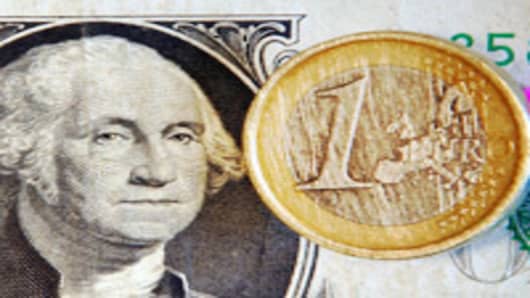The euro fell after high energy costs soured German business sentiment and the euro zone's manufacturing and services sectors contracted last month, denting the case for higher euro zone interest rates.
The dollar, meanwhile, rose broadly ahead of a Federal Reserve meeting this week that investors expect to involve stern talk about the risks of rising inflation.
By late morning, the euro had fallen to about $1.55, while the dollar was hovering near 108 yen , up about 0.6 percent from late on Friday.
The Fed is expected to hold rates at 2 percent on Wednesday but surging energy and food price inflation has futures markets pricing in a pair of rate hikes by year end.
The U.S. central bank "will likely indicate that it is on heightened alert (for inflation) or something in that vein" in its post-meeting statement, said Marc Chandler, senior currency strategist at Brown Brothers Harriman in New York.
In a note to clients, strategists at BNP Paribas said that "a special mention of import prices would indicate the Fed is looking to boost the dollar."
Unlike the Fed, the European Central Bank signaled a rate hike in July, though officials have been at pains to make clear that this would not necessarily lead to a series of hikes.
That view was boosted by Monday's data, which showed the euro zone manufacturing and service sectors contracted in June, the latter for the first time in five years.
At the same time, the German Ifo business climate index fell to its lowest level since December 2005.
"When you look at the data, you wonder if even one hike is justified. But they went out on a limb saying they were going to hike rates, and now they have to do it," said John McCarthy, director of foreign exchange at ING Capital Markets in New York.
"It's a bit of a mess, and people are a bit confused."
That confusion was weighing on the euro, which last traded down 0.7 percent at $1.55, near a session low of $1.5469. The dollar index added 0.8 percent to 73.561, while the euro fell 0.2 percent to 167.11 yen .
The dollar rose 0.5 percent to about 107 yen, boosted after a Japanese government survey of large manufacturers showed sentiment deteriorated in the second quarter.
Data Dampens
Following the German and euro zone data, the Bundesbank said Germany's economy is set to contract slightly in the second quarter of this year after expanding at its strongest clip since 1996 in the first three months.
Although analysts said it was probably too late for the ECB to abandon its plans for a July rate hike to 4.25 percent, they admitted the data reduced the chance of additional tightening.
"The falls are probably not sharp enough to stop the ECB hiking in July. It would take more data on the downside for inflation for them to wait," said Juergen Michels, economist at Citigroup in London. "But the data today will cause some intense debate about rate-setting."
The Fed, meanwhile, was seen as more likely to hike rates the longer oil remains at elevated levels.
"It seems likely (the Fed) would respond to rising oil by tightening monetary policy, so that is a supportive feature for the dollar," said Derek Halpenny, senior currency strategist at BTM-UFJ in London.


